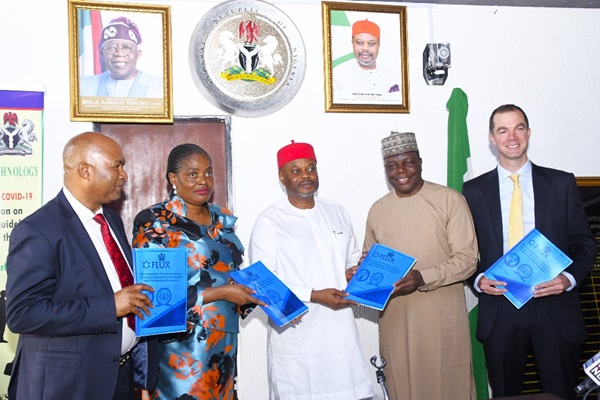
In a bid to tackle the pressing challenge of food security, the Minister of the Federal Ministry of Innovation, Science and Technology (FMIST), Chief Uche Nnaji has emphasised the pivotal role of science and technology in transforming Nigeria’s agricultural sector.
Nnaji highlighted that leveraging these tools can significantly enhance productivity and ensure that “no Nigerian goes hungry.”
The minister made these remarks during the signing of a memorandum of understanding (MoU) between the ministry, Flux and the National Biotechnology Research and Development Agency (NBRDA) in Abuja. This partnership is aimed at introducing innovative methods to boost crop yields, reduce costs for farmers and promote sustainable agricultural practices.
“Agriculture is the backbone of Nigeria’s economy, contributing a substantial 25 per cent to our GDP and providing livelihoods for more than 70 per cent of our people,” Nnaji stated. He pointed out that despite its importance, the sector faces significant challenges such as climate change, land degradation, rising costs, and inadequate technology adoption. The recent surge in food prices across the nation underscores the urgent need for innovative and sustainable solutions.
Nnaji noted that Flux’s collaboration with the National Biotechnology Research & Development Agency would ensure these solutions are tailored to Nigeria’s unique conditions, utilising local expertise and resources. He stressed the importance of this partnership in achieving shared goals of economic prosperity, environmental sustainability and social well-being for all Nigerians.
“This MoU symbolises our commitment to working hand in hand with local and international partners to create meaningful impact. By focusing on sustainable agriculture, we are not only addressing the immediate needs of food security but also creating jobs and fostering economic development,” Nnaji added.
Permanent secretary of FMIST, Mrs. Esuabana Asanye echoed the minister’s sentiments, emphasising that the ministry is making strides in line with global innovations to meet Nigeria’s needs. She highlighted that the signing of the MoU would lead to significant improvements in soil quality, a critical factor for achieving any agricultural success.
“The improvement of our soil quality is essential because, without good soil, we will not be able to achieve any agricultural exploits,” Asanye remarked.
Director-general of NBRDA, Prof. Abdullahi Mustapha elaborated on the mission of the partnership with Flux, describing it as an innovative approach to smart farming. He recalled that the agency recently released TELA maize, a development aimed at improving food security in Nigeria. Mustapha emphasised the importance of harnessing bio-resources from the environment to enhance soil quality, which he believes will significantly increase crop yields and contribute to Nigeria’s sustainable development.
“The improvement of the soil quality comes with harnessing the bio-resources around our environment. These resources, like the rocks we see around us, will be used to enhance soil qualities, making the soil more nutritious at zero cost. Farmers will find this very affordable and the yield is going to increase significantly, driving Nigeria forward towards improving food and nutrition security,” Mustapha explained.
He highlighted that the rocks used in this process will be thoroughly tested for compatibility, ensuring they are effective in improving soil health. Mustapha assured that this method would provide farmers with an almost free fertiliser alternative, reducing the cost of food production and alleviating the burdens faced by farmers.
“The rock, once applied, is expected to remain effective for up to 4-5 years without the need for additional fertilisers, with yields potentially increasing by 40-50 per cent. This is a game-changer for Nigerian agriculture,” he added.
CEO of Flux, Sam Daviel stressed that the MoU is a significant step towards harnessing innovative solutions to address global challenges, particularly in the areas of climate change and food security. He highlighted the potential of enhanced rock weathering (ERW) to sequester carbon dioxide and improve soil health, thereby contributing to climate resilience and agricultural productivity.
“By collaborating with the government of Nigeria through the Federal Ministry, we aim to explore the potential of ERW to enhance food security and contribute to sustainable development in Nigeria,” Daviel said.
He further explained that Flux uses enhanced rock weathering technology to crush rock into silicon powder, which is then spread on farmland. This method is expected to increase crop yields by an anticipated 44 per cent in Nigeria, significantly boosting agricultural productivity and contributing to the nation’s food security.
The partnership between FMIST, Flux and NBRDA represents a major stride towards addressing the critical challenges facing Nigeria’s agricultural sector and ensuring a food-secure future for all Nigerians.

